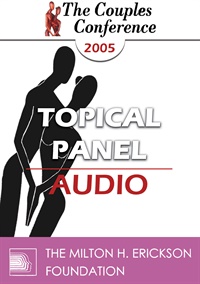
- Average Rating:
- Not yet rated
- Topic Areas:
- Topical Panels | Attachment | Couples Therapy | Differentiation
- Categories:
- Couples Conference | Couples Conference 2005
- Faculty:
- Ellyn Bader, PhD
- Duration:
- 1:05:52
- Format:
- Audio Only
- Original Program Date:
- Mar 05, 2005
- Short Description:
- CC05 Panel 02 - Attachment and Differentiation in Couples Therapy - Ellyn Bader, PhD
- Price:
- $15.00 - Base Price
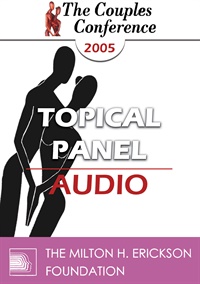
- Average Rating:
- Not yet rated
- Topic Areas:
- Topical Panels | Couples Therapy | Gender
- Categories:
- Couples Conference | Couples Conference 2005
- Faculty:
- Frank Dattilio, PhD, ABPP | Peggy Papp, ACSW
- Duration:
- 1:02:16
- Format:
- Audio Only
- Original Program Date:
- Mar 05, 2005
- Short Description:
- CC05 Panel 03 - Dealing with Gender Differences - Frank Dattilio, PhD and Peggy Papp, ACSW
- Price:
- $15.00 - Base Price
Tags: Couples Therapy Gender
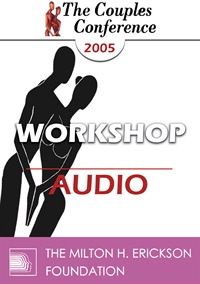
- Average Rating:
- Not yet rated
- Topic Areas:
- Workshops | Affairs | Couples Therapy | Trauma | Infidelity
- Categories:
- Couples Conference | Couples Conference 2005
- Faculty:
- Janis Abrahms Spring, PhD, ABPP
- Duration:
- 1:55:56
- Format:
- Audio Only
- Original Program Date:
- Mar 04, 2005
- Short Description:
- Infidelity is not necessarily about sex, but about secrets and the violation of trust. In this workshop, Dr. Spring will map out the trauma of an affair (or other intimate wounds) and help partners think through whether or not, and how to reconcile.
- Price:
- $15.00 - Base Price
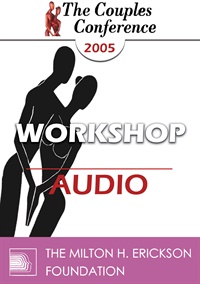
- Average Rating:
- Not yet rated
- Topic Areas:
- Workshops | Couples Therapy | Relational Life Therapy Model (RLT)
- Categories:
- Couples Conference | Couples Conference 2005
- Faculty:
- Terry Real, LICSW
- Duration:
- 1:52:59
- Format:
- Audio Only
- Original Program Date:
- Mar 04, 2005
- Short Description:
- This workshop introduces participants to the fundamentals of Relational Recovery Therapy, a new approach to couples therapy. The workshop follows the phases for treatment: empowering the woman; connecting the man; relational "diagnosis"; prerequisites for intimacy; describing a new vision of love; learning relational skills; amplifying progress; building a relational sub-culture. This workshop will look closely at the art of therapeutic truth telling.
- Price:
- $15.00 - Base Price
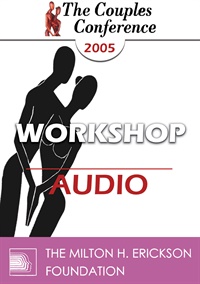
- Average Rating:
- Not yet rated
- Topic Areas:
- Workshops | Couples Therapy | Hypnosis | Hypnotherapy | Experiential Therapy
- Categories:
- Couples Conference | Couples Conference 2005
- Faculty:
- Jeffrey Zeig, PhD
- Duration:
- 2:08:39
- Format:
- Audio Only
- Original Program Date:
- Mar 04, 2005
- Short Description:
- Hypnosis is an experiential method of "gift wrapping" ideas. With or without formal trance, hypnotic methods can be used in the assessment and intervention process of couples therapy.
- Price:
- $15.00 - Base Price
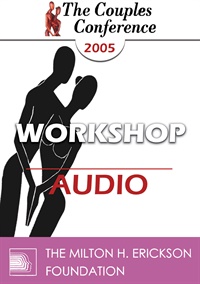
- Average Rating:
- Not yet rated
- Topic Areas:
- Workshops | Couples Therapy | Marriage | Intimacy | Forgiveness
- Categories:
- Couples Conference | Couples Conference 2005
- Faculty:
- Janis Abrahms Spring, PhD, ABPP
- Duration:
- 1:59:31
- Format:
- Audio Only
- Original Program Date:
- Mar 04, 2005
- Short Description:
- Forgiveness has been held up as the gold standard of recovery from intimate wounds. Often people find forgiveness too generous, particularly when the offender is unrepentant. Dr. Spring proposes a bold, new healing alternative that lets us make peace with the past- with or without forgiving.
- Price:
- $15.00 - Base Price
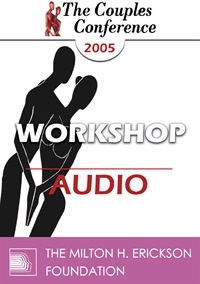
- Average Rating:
- Not yet rated
- Topic Areas:
- Workshops | Couples Therapy | Relational Life Therapy Model (RLT)
- Categories:
- Couples Conference | Couples Conference 2005
- Faculty:
- Terry Real, LICSW
- Duration:
- 1:57:24
- Format:
- Audio Only
- Original Program Date:
- Mar 04, 2005
- Short Description:
- Couples notoriously have the same fight for 40 years. They're not speaking to each other, but to each other's core negative image. This workshop teaches participants to identify and share each partner's CNI of the other, how these CNis interact to produce vicious circles and how to break the pattern.
- Price:
- $15.00 - Base Price
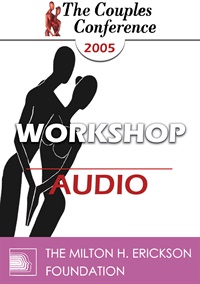
- Average Rating:
- Not yet rated
- Topic Areas:
- Workshops | Couples Therapy | Neurobiology | Relationships | Neuroscience | Intimacy
- Categories:
- Couples Conference | Couples Conference 2005
- Faculty:
- Pat Love, EdD
- Duration:
- 1:40:11
- Format:
- Audio Only
- Original Program Date:
- Mar 04, 2005
- Short Description:
- The new brain science explains many of the mysteries of love and offers new hopes for troubled relationships. Neuro-scientific approaches are used to address the most common reason cited for divorce, i.e. growing apart. Three clinical techniques will be presented which are specifically designed to create an intimate bond between two people and pave the way to grow together instead of apart. Lecture, video, handouts and experiential exercises will be used.
- Price:
- $15.00 - Base Price
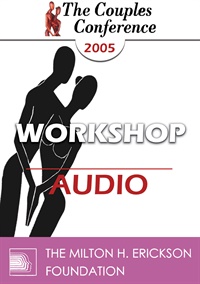
- Average Rating:
- Not yet rated
- Topic Areas:
- Workshops | Couples Therapy | Neurobiology | Love | Neuroscience
- Categories:
- Couples Conference | Couples Conference 2005
- Faculty:
- Helen E. Fisher, PhD
- Duration:
- 1:38:06
- Format:
- Audio Only
- Original Program Date:
- Mar 05, 2005
- Short Description:
- Anthropologist Helen Fisher discusses the brain networks associated with romantic love to explain frustration attraction, abandonment, rage, the despair response, love, addiction, stalking, love, suicide and other phenomena associated with romantic rejection. She concludes that long term use of serotonin-enhancing antidepressants can jeopardize romantic love and attachment to a mate.
- Price:
- $15.00 - Base Price
Tags: Couples Therapy Love Neuroscience
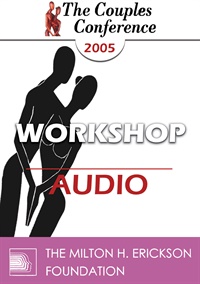
- Average Rating:
- Not yet rated
- Topic Areas:
- Workshops | Couples Therapy | Developmental Therapy Model | Confrontation | Therapist Development
- Categories:
- Couples Conference | Couples Conference 2005
- Faculty:
- Ellyn Bader, PhD
- Duration:
- 1:45:16
- Format:
- Audio Only
- Original Program Date:
- Mar 05, 2005
- Short Description:
- Difficult couples challenge therapists with their aggressive interactions, their demands for intimacy and their high levels of sensitivity to any confrontation. Dr. Bader will demonstrate how to start and sustain positive momentum with these high distress couples. Participants will discover how to create a context for change that uses four pillars to anchor all sessions. Participants will learn to make strong confrontations, take a firm leadership role and more smoothly interweave intra-psychic and systemic interventions. Video, role-play and clinical transcripts will all be used to demonstrate these principles.
- Price:
- $15.00 - Base Price
Please wait ...

